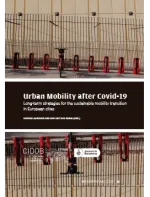Co-creating knowledge, policies and collaborative action for sustainable, low-carbon urban transport

2020, a year of historic change and disruption, has shown us the extent to which access to transport and mobility in our cities determines access to livelihoods, jobs, essential goods and socioeconomic opportunities in general. We have also experienced how the resilience of passenger and freight transport systems is essential in times of global and local shock.
In the wake of the COVID-19 pandemic, we have appreciated living with better air quality and less noise. Movement restrictions have shown us the extent to which our neighbourhood streets and public spaces are essential to community cohesion. With our sudden plunge into a “new normality”, we have learnt the hard way that mobility behavioural change at community and individual levels can happen at a much faster pace than we had thought. We have also seen that governments can affect radical change to public mobility policies and expenditure overnight, if they want to.